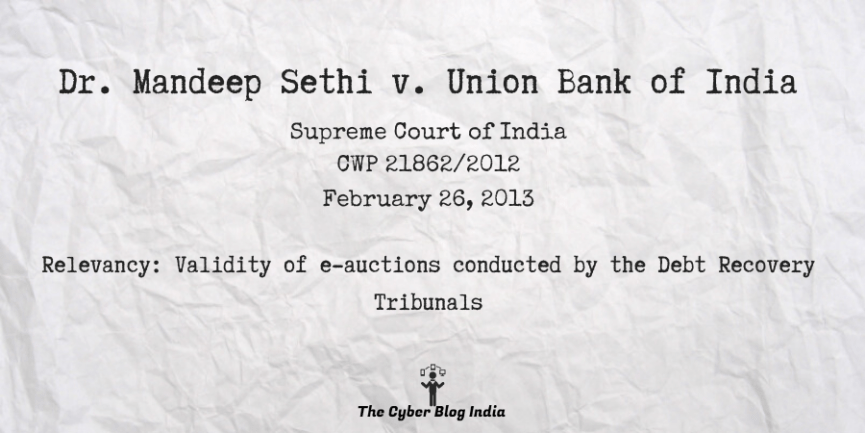Dr. Mandeep Sethi v. Union Bank of India

Dr. Mandeep Sethi v. Union Bank of India
In the High Court of Punjab & Haryana
C.W.P. No. 21862/2012
Before Justice Hemant Gupta and Justice Ritu Bahri
Decided on February 26, 2013
Relevancy of the case: Validity of e-auction conducted by the Debt Recovery Tribunals
Statutes & Provisions Involved
- The Information Technology Act, 2000 (Section 4, 10-A)
- Recovery of Debts Due to Banks and Financial Institutions Act, 1993 (Section 29)
- Income Tax (Certificate Proceedings) Rules, 1962 (Rule 56)
Relevant Facts of the Case
- The Government of India, Ministry of Finance issued instructions directing the Presiding Officers of the Debt Recovery Tribunals to conduct all auctions electronically.
- The petitioner filed the current writ petition against these instructions. In addition, the petitioner challenged the orders passed by the Debt Recovery Tribunal in the matter of attachment and sale.
- However, in the proceeding, the Court limited itself to deciding the challenge of e-auction only.
Prominent Arguments by the Advocates
- The petitioner’s counsel, Mr. I.P. Singh, contended that auctions where the interested bidders give their bid through an electronic medium, in a proper format, do not fall under the definition of public auction under Rule 56 of the Income Tax (Certificate Proceedings) Rules, 1962.
- Per(Chairman and Managing Director, SIPCOT, Madras & others vs. Contromix Pvt. Ltd. by its Director (Finance) Seetharaman, Madras & Anr. the dominant consideration is to secure the best price for the property to be sold. It can happen only when there is maximum public participation in the process of a sale.
- Furthermore, the counsel argued that in remote areas where there is an absence of a computer facility or computer professionals, e-auction will frustrate the intention of obtaining the maximum price for the property to be sold. Therefore, such a process of auction is not legal and valid.
- The respondent’s counsel relied on Sections 4 and 10-A of the Information Technology Act (2000). The counsel contended that the electronic scheme is an alternative for anything required in a written or printed format.
Opinion of the Bench
- The bench observed that the advantage of e-auction is that every recorded bid is within a specified slot and is free from errors, especially those committed by the court auctioneer.
- Furthermore, the court observed that e-auction is another form of public auction, deemed to be included in Rule 56 of the said Rules. It should be a preferred mode of auction.
- However, there is no provision in the statute which confers jurisdiction on the Central Government to issue directions to the Debt Recovery Tribunals. Hence, the government was incompetent to issue any direction in the purview of discharging its functions by the Debt Recovery Tribunals to order public auction in a particular manner only.
- Nonetheless, the bench recommended that the instructions issued on 13.06.2012, should be a worthy suggestion by the Debt Recovery Tribunals to conduct transparent and fair auctions.
Final Decision
- The bench directed the Debt Recovery Tribunals to adopt the process of e-auction for properties in municipal areas.
- However, concerning properties in rural areas, the court allowed the discretion of the tribunals to order e-auction as it may consider appropriate.
To read this case summary in Hindi, click here. | इस केस सारांश को हिंदी में पढ़ने के लिए यहाँ क्लिक करें।
